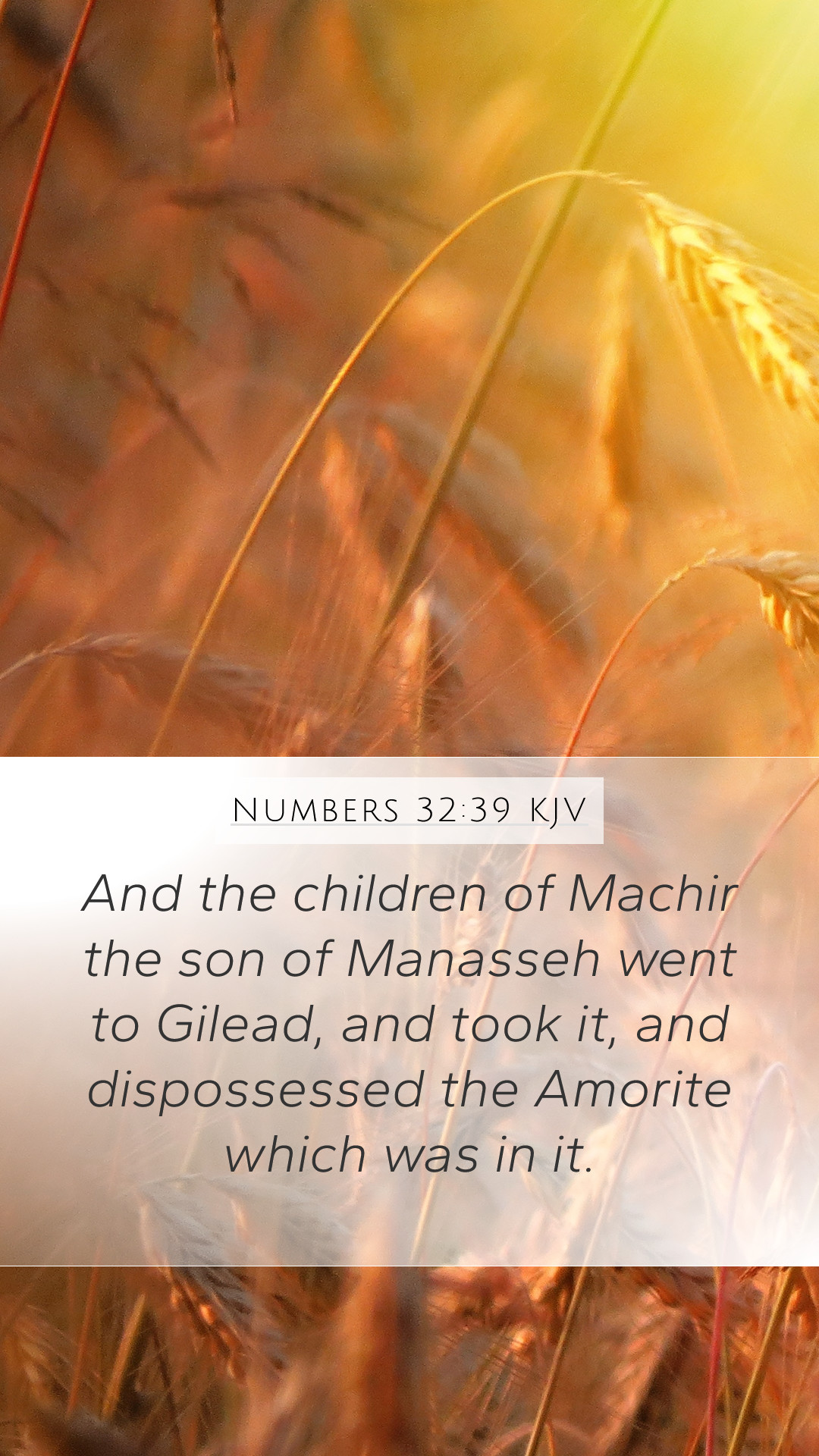Understanding Numbers 32:39 - Bible Verse Meaning and Commentary
Numbers 32:39 states, "And the children of Machir the son of Manasseh went to Gilead, and took it, and dispossessed the Amorite which was in it."
This verse narrates the actions of the children of Machir, emphasizing their role in the conquest of Gilead from the Amorites. To grasp the full significance of this passage, it is essential to consider various biblical commentaries.
Contextual Background
The context of this verse occurs during the Israelites' journey to the Promised Land. The tribes of Reuben and Gad had expressed their desire to settle in the land east of the Jordan River, which necessitated military action to secure their claim against the Amorite kingdoms. This setting highlights the themes of faithfulness, territorial possession, and God's promises to His people.
Biblical Commentary Insights
-
Matthew Henry Commentary:
Matthew Henry emphasizes that the success of Machir’s descendants illustrates the fulfillment of God's promises to His people. The act of dispossessing the Amorites symbolizes the overarching theme of divine judgment against nations that oppose God's will. Henry also notes that Machir's actions serve as a model of bravery and obedience to God's commands.
-
Albert Barnes Commentary:
Albert Barnes provides further insights into the significance of Machir's lineage. He explains that Machir, being the firstborn of Manasseh, signifies the strength and leadership qualities prevalent within his descendants. Barnes stresses that their conquest is not merely a military endeavor, but also a direct response to God’s promise of land to the Israelites, symbolizing a path to repentance and alignment with divine purpose.
-
Adam Clarke Commentary:
Adam Clarke’s exploration focuses on the geographical implications of the conquest. He notes the strategic significance of Gilead and its essential role in the overall settlement of the Israelite tribes. Clarke elaborates on the historical context, mentioning the prior occupation of the land by the Amorites, thereby underscoring the importance of the Israelites reclaiming what was rightfully theirs through God’s sovereignty.
Thematic Elements
The actions described in Numbers 32:39 encapsulate several core biblical themes:
- Fulfillment of Promises: The verse is a testament to God's unwavering commitment to bless the Israelites and lead them to their promised territories.
- Faith and Obedience: The willingness of Machir’s children to engage in battle demonstrates their faith in God's direction and their readiness to act upon it.
- Divine Justice: The dispossession of the Amorites can be seen as God's judgment, reflecting a recurring motif in scripture where God uses Israel as an instrument of His will against unrighteous nations.
Application in Bible Study
For those engaging in Bible study groups, Numbers 32:39 serves as a rich text for exploring Bible verse explanations and Bible verse interpretations that can be applied to modern living. Here are some insights:
- Consider how God's promises manifest throughout our lives and the importance of having faith as we pursue them.
- Discuss the principle of spiritual warfare and the importance of standing firm against challenges that oppose our faith.
- Reflect on the significance of taking ownership of our spiritual inheritance and what it means to fight for it.
Cross References
To deepen the understanding of Numbers 32:39, consider the following cross-references:
- Deuteronomy 3:12-13: It highlights the division of the land among the tribes and the specific inheritance of Gilead to the descendants of Machir.
- Joshua 17:1-2: This passage details further information on the land assigned to the tribe of Manasseh.
- Romans 8:37: A New Testament application emphasizing that believers are more than conquerors through Him who loved us.
Final Thoughts
In summary, Numbers 32:39 encapsulates a profound narrative of conquest, legacy, and divine promise. For anyone seeking Bible study insights or biblical exegesis, this verse provides a vital lesson on dedication to faith, the significance of obedience to God, and understanding the historical context of Israel's inheritance. Engaging with such verses not only enriches personal faith but also equips believers to extend their understanding into practical applications in daily life.


